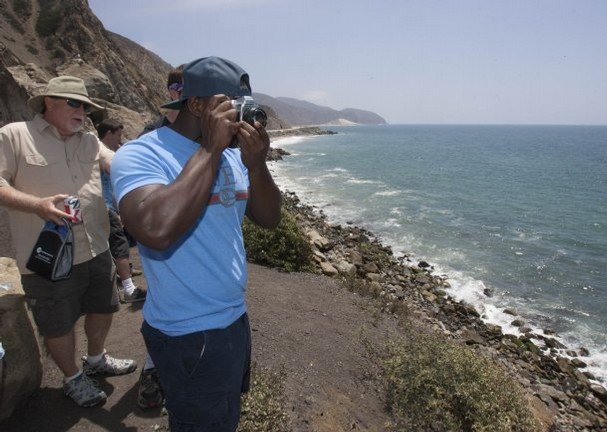CLU expands summer school to offer flexibility
New Surf and Turf class epitomizes the culture shift

Christian Hogan (right) takes a picture from an overlook on the south side of Mugu Rock while professor Bill Bilodeau discusses geology.
Photo: Richard Quinn/ Ventura County StarIf you were a college student, wouldn’t you take a summer class called surf and turf? Especially if it meant you got to go to the beach and explore the local mountains?
That’s one of the classes California Lutheran University is offering as it expands summer school, working toward a year-round program that gives students more flexibility in taking courses, especially if they work, play sports or want to study abroad.
“We’re an academic institution, and academics is what we should be doing year-round,” said Joan Griffin, dean of the College of Arts and Sciences. “Very few other institutions shut down during the summer.”
Summer school lets students take classes they need but might not be able to get into during the traditional school year — classes such as freshman biology or organic chemistry that fill up quickly because lab space is limited, Griffin said.
Students who have fallen behind, perhaps because they changed their major, can also catch up, so they can still graduate in four years.
And summer school can stretch traditional two-semester classes into three semesters, giving students more flexibility in their schedules. That can be especially helpful for science majors, who have had a hard time studying abroad because their course work is so structured.
“Some of those science majors are a little unforgiving, the way (the classes) really build on each other,” Griffin said.
The classes themselves can be more fluid, too, letting students and faculty take longer field trips, which can be challenging during the regular school year because they often conflict with other classes or work.
“It gives you some flexibility to do things differently,” Griffin said.
Summer school has been growing more popular as students try to graduate in four years, said Matt Ward, vice president for enrollment management and marketing. Some schools have even considered offering a three-year degree.
“The economy made people think more about — can we accelerate getting a degree,” Ward said. “For public institutions it’s been more challenging, so private institutions are stepping in. ... But it does require a major culture shift.”
The surf and turf class epitomizes that culture shift. It’s held on Thursday evenings and Saturdays. It’s a mix of geology and biology, meant for students who aren’t majoring in science. And it mixes traditional lectures with lots of exploring the outdoors.
“They get a feel for what it’s like to get out and make observations, which is what science is all about,” said Bill Bilodeau, a geology professor who is teaching the class with a biology professor. “It’s also a lot more fun to get out.”
Of course, summer school does present some challenges for students — the main one being that it’s summer, Bilodeau said.
“They have a tough time focusing,” he said.
On Saturday, students went to Point Mugu and El Matador State Beach in Malibu, where they discovered, identified and sketched tide-pool creatures.
The week before, they visited the San Andreas Fault in Palmdale, as well as Vasquez Rocks.
Christian Hogan, 21, a senior majoring in English, has two main reasons for taking the class. He plays football, so he wants to spread his classes out over the year. And he put off taking his science requirement as long as he could.
“I was avoiding it all costs,” he said.
“I’d rather do it when I have nothing else to do but train.”
Then, of course, there’s the appeal of a class that revolves around field trips, said Lara Muir, 20, a junior majoring in communication.
“I saw that we’d be going to Malibu,” Muir said. “I thought, ‘I like going to the beach. I could enjoy this.’”
The timing of the class appealed to Annie Quist, 20, a junior majoring in business who is also doing an internship this summer.
“It makes working and interning possible,” she said. “Part of it is practical.”
CLU is also offering an online class for the first time this summer — a biology class in genes and development that will mix some traditional class time with online lectures.
“We’re asking ourselves, ‘What can we do better online that we do in the classroom?’” Griffin said. “We’re also asking, ‘What should we never do online?’”
Students pay $705 a unit for summer classes, which generally are three to four units each. So one class costs somewhere between $2,115 to $2,820. A traditional semester, when students generally take four classes, costs $17,635. However, financial aid for undergraduates does not cover summer school.
In addition to offering more classes, CLU also is expanding activities for students over the summer. This weekend, they can take surf lessons. Next month, they’ll go horseback riding.
“Summer,” Griffin said, “can be played in a different key.”
Summer School
Some of the 40 or so classes students can take at California Lutheran University this summer:
- Principles of biology, with lab
- Applied calculus
- Ancient political thought
- Islamic religion
- Elementary Spanish
- World civilization to 1500
- Literature of the Americas
- Composition
- Digital photography
--- Published in the Ventura County Star on July 11, 2013